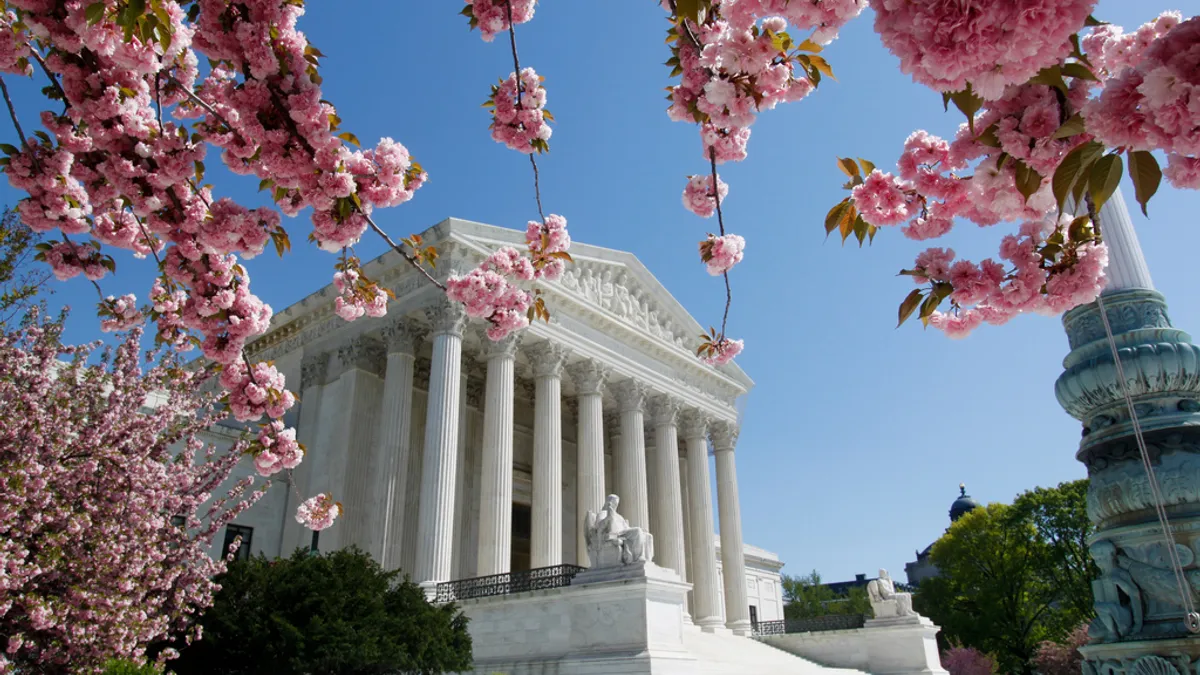The following is a contributed article by Michael Hogan, senior advisor at the Regulatory Assistance Project.
The issue of states' rights has a long and turbulent history in this country. While we are unlikely to come to blows over organized wholesale power markets, the question of states' rights in the regions covered by regional transmission organizations (RTOs) has become rather animated of late.
Just this week, the Supreme Court denied petitions by fossil generators for review of lower court rulings upholding state policies in two different RTO regions targeted at forestalling closure of zero-emission nuclear plants.
That's not to say this is a new issue for these markets, but a number of stressors have converged to give it new "energy." These include growing dependence on natural gas, Trump administration efforts to subsidize coal, the absence of a federal policy on carbon pricing and RTO efforts to counteract the impacts of both state renewable portfolio standards and the aforementioned state policy instruments.
As states have sought to respond to these developments, some administrators of competitive markets and market proponents have pushed back against what they see as inappropriate and harmful intervention.
How to sort out where the states are in the right, and where they are in the wrong? A good place to start is with the Supreme Court decision in Hughes v. Talen Energy Marketing.
The Court's decision affirmed that "[s]tates, of course, may regulate" in the public interest "even when their laws incidentally affect areas within FERC's domain." Reliability is certainly a matter of public interest. However, states that did not opt to ensure resource adequacy on their own when they joined an RTO agreed to delegate to the RTO the role of assuring reliable electric supply at least cost.
They did so in return for the benefits of full participation in the organized market, subject to various conditions regarding governance. The RTOs have at their disposal all the tools necessary to carry out that responsibility and a remit to deploy those tools, subject to FERC regulation.
The shifting fuel and technology mix across the RTO regions presents system operators with new challenges in ensuring reliability, but those challenges are engineering problems with engineering solutions.
There is no evidence that the changing fuel mix has posed any problem that RTO markets are not capable of managing efficiently. In fact, there are system operators elsewhere in the world, for instance in Britain and Spain, which are dealing with far more drastic shifts in resource mix and are successfully taking the lead on solving those challenges.
States should have to make an affirmative showing that the RTO cannot be counted upon to ensure reliability to accepted standards before they would be justified in intervening in the fuel mix on reliability grounds. Absent that, states taking actions on reliability grounds that would affect market outcomes — such as blocking new entry, subsidizing in-state entry, or underwriting the continued operation of existing resources — should expect that the RTO may act to neutralize such actions.
The externality cost of emitting greenhouse gases has also been established as a matter of public interest, and some states have chosen to act on that interest.
States did not delegate responsibility to RTOs for environmental policy matters, and RTOs have no federal mandate to effect or affect policy on those matters. While FERC and FERC-regulated RTOs have been granted jurisdiction over matters of reliability, they have no jurisdiction over environmental matters (FERC has only the authority to "consider" such matters). These are matters reserved to federal and state governments.
In the absence of federal action, states recognizing the public interest in the externality costs associated with buying high-carbon energy have not chosen to — and indeed cannot — rely on the RTO to address that interest. So state energy policies intended to address recognized environmental externalities should be understood as substantively distinct from state energy policies aimed at reliability issues.
As a result, states adopting policy on environmental grounds that would "incidentally affect" market outcomes, such as energy portfolio purchase obligations that increase the market value of energy from certain types of resources and reduce the market value of others, should be free to do so without interference from the RTO.
The scope of RTO jurisdiction to act in response extends only to policies that unduly discriminate in favor of in-state resources or specific plant owners, or that otherwise unduly interfere with competition in RTO markets. (Suitable mitigation measures would be warranted where state policy creates a material risk of buyer- or seller-side market power abuse.) Within those constraints, states' ability to make these choices supersedes the RTO's mandate to operate the organized market.
The RTO therefore has no authority to obstruct or frustrate these state energy choices any more than it would be justified in obstructing or frustrating a choice by any wholesale customer (for instance, Walmart or US Steel or a retail provider in a retail competition state) to procure energy from certain types of resources and in so doing drive up the market value of energy from such resources.
The issue of states' rights will always be contentious. But in the case of states that have joined RTOs, there is a clear distinction to be drawn where state energy policy "incidentally affects" RTO market outcomes.
States in RTO markets adopting energy policies based on reliability concerns should expect the RTO to take measures to neutralize any collateral impacts on market outcomes. States adopting energy policies based on recognized environmental externalities, however, have a right to expect that the RTO will accommodate any collateral impacts those policies may have on market outcomes.






















